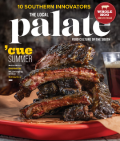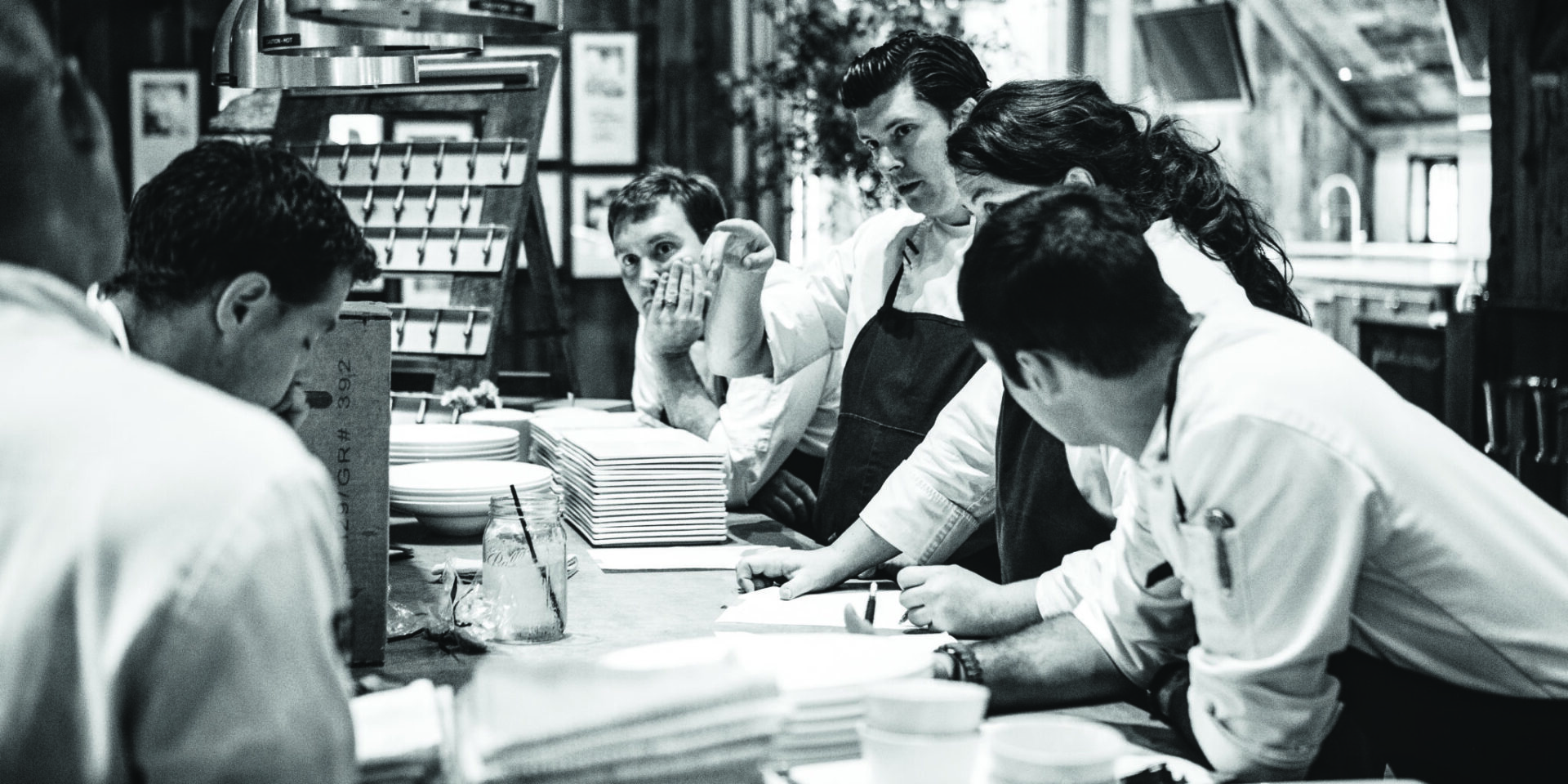Tennessee’s Blackberry Farm may be known as one of the most relaxing places in the world, but for its executive chef Joseph Lenn, it’s work.
The esteemed resort bustles with guests, special events, and visiting chefs and sommeliers from around the globe. It’s Lenn’s duty to keep them all well fed. He does so with a culinary wizardry that won him this the 2013 coveted James Beard Foundation Award for Best Chef: Southeast. His reward? The occasional right to hang a sign on his door that reads, “Gone fishin’.”
When he wants to relax, Lenn escapes to the pristine streams and rivers of East Tennessee. The combination of casual and formal at Blackberry Farm befits Lenn as he sheds his chef’s toque in favor of a fishing cap and steps into the crystal waters of Hesse Creek that run through the property.
This well-managed stream harbors rainbow and brown trout that are up to three times as large as the typical fish in the nearby creeks of the Smokies. Careful population control allows the local fish to maintain healthy numbers and grow bigger and heartier than their wild cousins.
The Lure of the Lake
Even with access to all the huge rainbows at Blackberry Farm, Lenn prefers to head to the tailwaters of the Clinch and Holston Rivers to chase their native fish.
“It’s not about the numbers I catch anymore,” says Lenn. “As I have less time to fish, there is less competition with myself. It’s more about just getting to go and spend the time in nature.”
This is quite a change for the chef who admits to once having fished thirty-seven days in a row after graduating high school. He would call work claiming to be delayed by a wreck on the interstate so he could stay on the river. “This was before the internet when people could really check those things.”
Lenn also prefers not to cook wild trout, partly for ecological reasons to maintain population numbers, but mainly because of the taste and texture profiles. “A lot of the fish in the rivers around here have been stocked at different points in their life spans and most of them have been fed on ‘fish chow’ at one time or another. This leads to a meat that is the color of hay and can be really mealy or soft.”
Instead, Lenn sources his trout from nearby Sunburst Trout Farms on the other side of the mountains in Canton, North Carolina. “Those fish live on a plant-based diet and have beautiful pink and firm flesh that is the closest to a real wild fish. We can get fresh delivery via FedEx of exactly what we need for the guests, and Sunburst offers other items like hot smoked and cold smoked trout and trout roe in addition to the fresh filets that can appear on our menu.”
Lenn’s Greatest Catch
The dishes on that menu demonstrate many of the same virtues that the chef employs in the trout stream. As the leader of a talented kitchen brigade, Lenn knows the importance of patience and persistence.
“You aren’t necessarily going to perfect a new dish on the first attempt, especially if you are experimenting with new ingredients and techniques. But if you emphasize a level of consistency of product and techniques, eventually you’ll succeed. When I spot a big fish hiding in a hole, I’ll park it and throw at it for hours, unlike some folks who will bang around from hole to hole and muddy up the whole creek.”
Lenn ties his own trout flies as lures, both as an outlet for his creativity and to ensure that he is presenting something that the fish want to eat.
One time, though, there was another reason why he tied a particular box full of flies. He tied all the lures with white thread–a color that wouldn’t attract a fish in any creek in the region. Yet, Lenn managed to land a big one with those flies.
“Before we were married, I convinced my wife Kathryn to join me on a trip to Blackberry Farm under some pretense. I had to tell her several stories to get her to come along. We fish together often, so I brought a couple of rods with us. We came down here to Hesse Creek, and I made sure to put on a fly that wouldn’t catch any fish so that she would want to change to a new one.
“I handed her this box and nestled among the elegant white streamers was a diamond ring. Once she said yes I asked, ‘So you don’t want to fish anymore?’”
The Seriousness of the Season
Whether Lenn’s trying to convince a trout or a dining patron to eat one of his creations, he must pay attention to the seasonality and local appropriateness of what he is serving up. “Trout only strike at what is naturally occurring in that particular time and place. If your hand-tied flies don’t match what is currently hatching, you can’t fool them into feeding.”
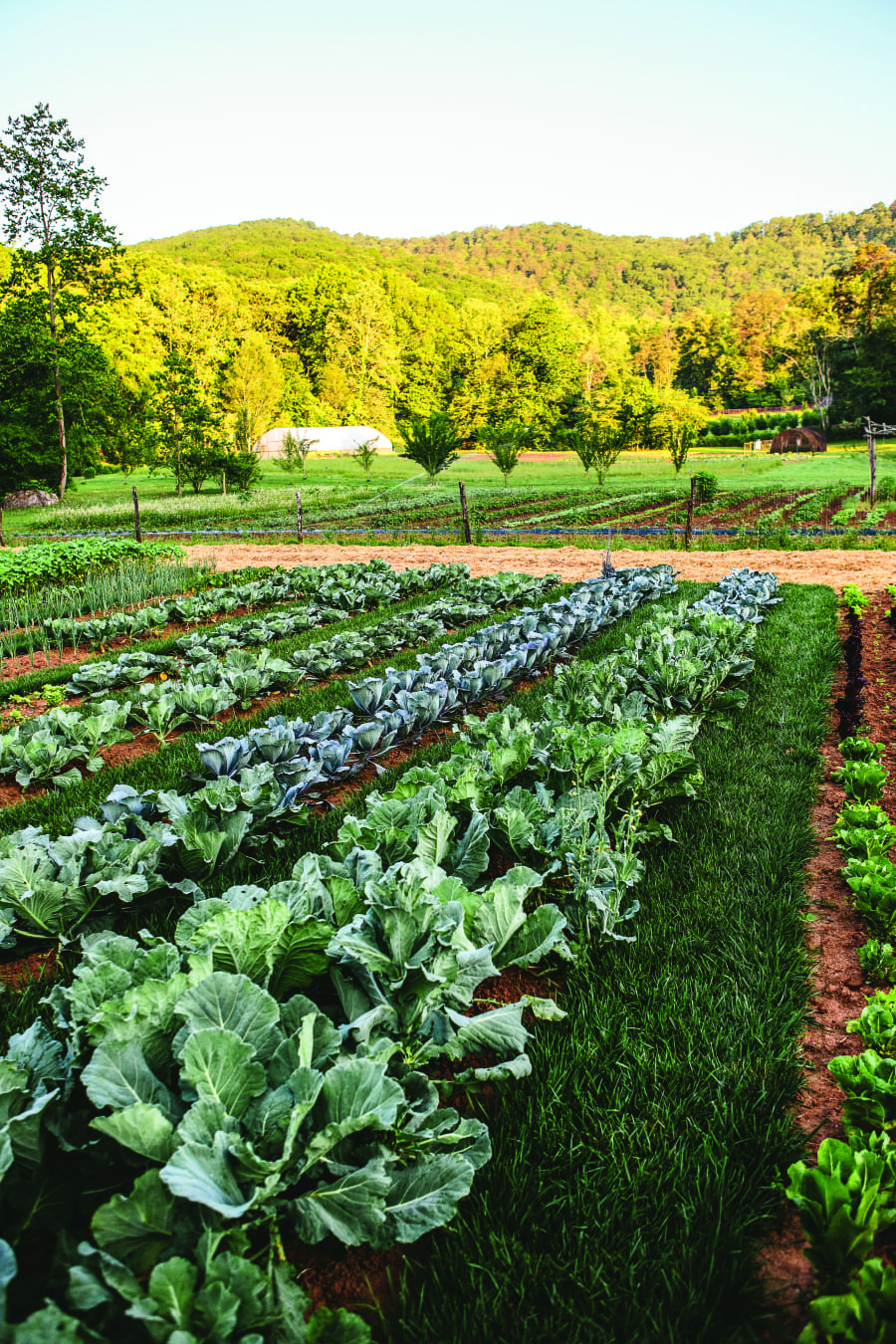
By the same token, Lenn’s menu at The Barn changes daily depending on what are absolutely the freshest most seasonally appropriate ingredients available. The chef consults each morning with the gardeners who tend the extensive plot of vegetables, legumes, and greens that grow within a short walk of his kitchen. Lenn also buys from many local farmers that produce various ingredients for Blackberry Farm.
“Quality of ingredients can trump locavorism, and we need a consistent supply. But we will always choose to support our neighbors whenever we can. People like Allan Benton who makes the best ham and bacon anywhere, and the folks at Cruze Farm who offer amazing dairy products make it easy to feature local purveyors.”
Seasonality is absolutely critical to choosing what flies to throw in the stream and what food to add to the menu in The Barn.
“Seasons are of the utmost importance to the cuisine here at Blackberry Farm, but we don’t count them by a calendar. When the weather is crazy like it was last year with such a late first frost, eggplant can last into November even though it’s not a fall ingredient. I can fish all year round, but it’s always changing from the Brown Fly hatch of spring to the summer Stone Flies.”
Lenn researches the diet of fish the same way he obsesses over the heritage species of beans that grow in his garden. There’s even a small entomology lab in the fishing cabin on Hesse Creek where Lenn and the Blackberry Farm guides keep examples of all the insects that the local trout feed on.
“You have to keep changing the menu to keep yourself and everyone else from getting bored. By Valentine’s Day, I’m sick of root vegetables so I look for new and creative ways to serve them.”
Both chefs and fishermen are noted for sharing their successful experiments, and Lenn takes advantage of their advice in both cases. “I’ve always been willing to experiment and learn from others. I learn fly-tying patterns and techniques from fishing guides the same way that I discover new recipes, ingredients, and cooking methods from friends like Sean Brock and Ashley Christensen.”
Kings of Consummé
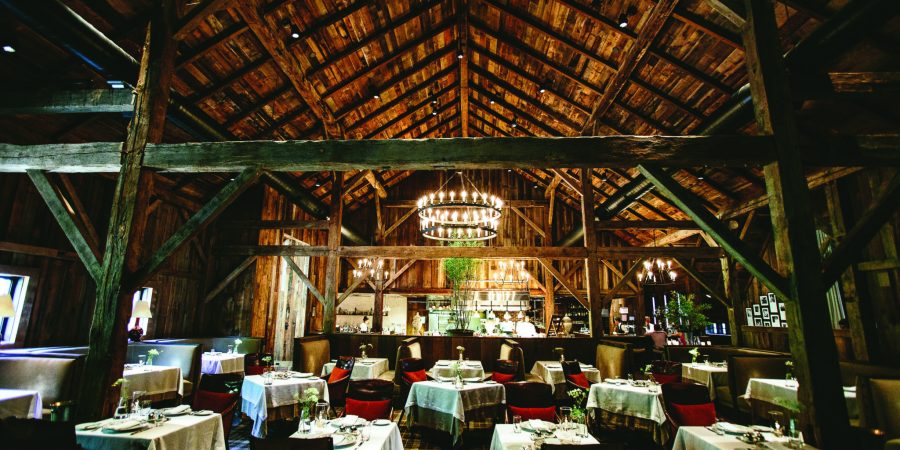
One dish on the menu at The Barn embodies many of these fisherman/chef virtues and demonstrates Lenn’s thoughtful approach to his cuisine. To most diners, the poached trout with buttermilk consommé, watercress, and radishes is just a beautiful, delicious entrée.
To the chef, it’s an expression of the importance of seasonal local ingredients presented in an attractive manner, just like a perfectly tied Smoky Mountain Blackbird Fly dropped delicately over the nose of a twenty-two-inch rainbow trout.
“Sean Brock showed me the technique for making the buttermilk consommé, which can take two or three days to complete, so that was a collaborative experiment that required a lot of patience. The Cruze Dairy buttermilk contributes a delightful acidity to the dish, but it requires several steps to separate the curds from the whey and clarify the milk into a consommé. The broth is meant to represent what fishermen call the ‘gin-clear’ water of Hesse Creek. We smoke the broth to offer a surprising smokiness, which most guests think comes from the trout, but we actually poach the trout to maintain the firm texture and beautiful pink color of the meat.”
Even the accompanying side dishes and garnishes of the dish are based on the native environs of Blackberry Farm.
“Sometimes watercress grows wild on the banks of the creek, but we use greens from another local farmer. The radishes come from our gardens and are perfectly round and red, to the point that the garden staff and I refer to them as ‘bobber radishes.’ I slice them thin to offer a little crunch to the dish.”
The result is a wonderfully light entrée that’s both simple and complex at the same time. Country Boy to Culinary Master, Joseph Lenn and his home at Blackberry Farm share this attitude toward casual elegance and seemingly effortless mastery of the guest experience. In the open kitchen at The Barn, diners in almost every part of the dining room can observe the chef direct his talented staff with a calm and quiet efficiency as they put out dish after dish of remarkable food matched with creative cocktails and a world-famous wine list of over 150,000 individual bottles on the property.
Chef’s Dish on Lenn
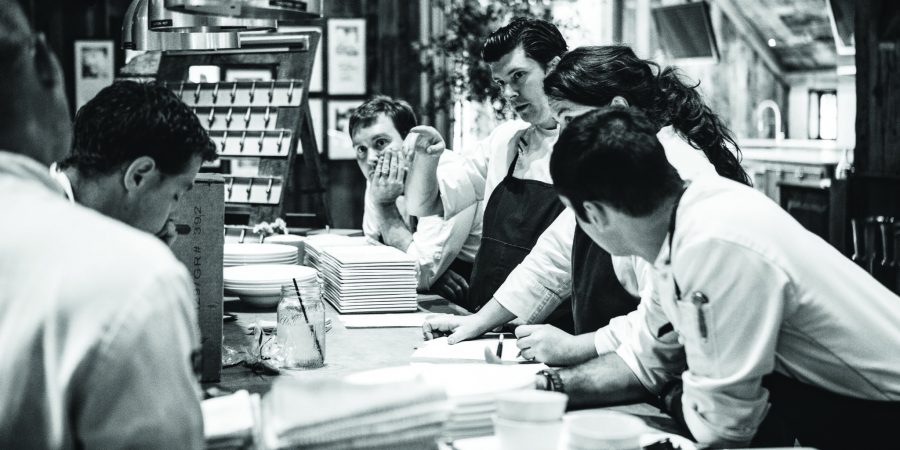
It’s easy to be jealous of Chef Joseph Lenn. The handsome young Knoxville native is the executive chef at The Barn at Blackberry Farm in Walland, Tennessee.
The resort is located on an idyllic site near the Great Smoky Mountains National Park in East Tennessee and has been recognized as the number one resort in the continental United States and Canada as well as the best resort in the country for food lovers.
Lenn himself was named Best Chef-Southeast at this year’s James Beard Foundation Awards and awarded the title of Grand Chef by the prestigious Relais & Chateaux organization. If anyone should be envious of Chef Lenn, you’d think it might be his fellow finalists for that coveted James Beard Award, but that’s not the case.
Ashley Christensen of Poole’s Diner in Raleigh is one of Lenn’s best friends. The two of them could be spotted giggling like schoolchildren as they pulled meat from a smoked whole hog at last year’s Big Apple BBQ Block Party in Manhattan and then created a menu for Christensen’s invitational dinner at the James Beard House that weekend.
Steven Satterfield, the chef/co-owner of Miller Union in Atlanta notes, “All of the Southeastern nominees for Best Chef are friends. We were texting, tweeting, and calling each other the day that they announced us each one at a time. I was so excited for all of us, I felt like we already won! For the record, we all made a pact that the winner would host the fellow nominees for a dinner, so the ball is in Mr. Lenn’s court.”
Tandy Wilson, fourth Beard nominee and chef at Nashville’s City House, jokes, “You’d think we wouldn’t like each other because he’s a hillbilly and I’m a redneck, but even in the middle of nowhere in Walland, Joseph cooks some of the most relevant food in the South. He is an icon who is committed to bringing it every single day with his brand of what Blackberry Farm calls Foothills Cuisine.”
This style combines haute cuisine with a dedication to preserving the cooking techniques and indigenous ingredients of the region around the Smoky Mountains.
The final nominee for Best Chef-Southeast this year was Ed Lee from 610 Magnolia in Louisville, Kentucky. Chef Lee sums up the respect of Lenn’s compatriots nicely.
“Love the guy: his hair, his talent, his undying commitment to his farmers, his hair, his friendship, his respect for the industry and his peers, his creativity, and did I mention his hair?”
Lenn’s raven-colored shock of hair is often combed back into a semi-pompadour and is a popular topic of conversation among his chef buddies, along with his down-home sensibilities.
“I definitely want to mention the hair,” shared Satterfield. “And the time that I cooked with him a few years ago for the Southern Foodways Alliance weekend. That was when I heard the first ‘Woooooooo!’ coming from his lips—that native Southern call of excitement that means more than the letters should ever allow. His favorite day that weekend was when they transformed one of the dining rooms at Blackberry Farm into NASCAR decor and served tailgating food. I’m pretty sure it was all his idea.”
Chef Lenn’s Recipes
Potato Salad with Pickled Ramps and Trout Roe
Poached Egg with Smoked Trout and Crispy Potatoes
Sumac-Dusted Smoked Trout with Beets and Arugula
Rainbow Trout with Buttermilk Consommé, Watercress, and Shaved Radishes
share
trending content
-
Grill Essentials
by Tate Jacaruso -
New Myrtle Beach Restaurants Making Waves
-
Staff Meal
by Tate Jacaruso -
In the Spirit: Distillery of Modern Art (DoMA) | Listen
by Amber Chase -
Asian Food Booms In the South
by TLP Editors
More From In the Field
-
Staff Meal
-
From Pop-Up To Brick-and-Mortar | Listen
-
The Return of the Lynnhaven Oyster | Listen
-
What’s On the Horizon for 2024
-
Sorelle: La Dolce Vita in Vogue
